May 8, 2025
Introducing the 2025-2026 Magnuson Scholars
On behalf of the University of Washington, the Board of Health Sciences Deans, and the Magnuson Scholar Program, we are pleased to announce the 2025–2026 Magnuson Scholars. Please join us in recognizing the 2025-2026 Magnuson Scholars’ exceptional achievements while also celebrating Warren G. Magnuson’s extraordinary public service career.
The 2025-26 Magnuson Scholars are:
| Celine Atkinson School of Dentistry |
Isaac Knouff School of Medicine |
Priscilla Carmiol-Rodriguez School of Nursing |
| Hui-Hsuan Chan School of Pharmacy |
Yilda Macias School of Public Health |
Natalie Turner School of Social Work |
| Brittany Jones-Cobb School of Social Work |
Scholar Profiles
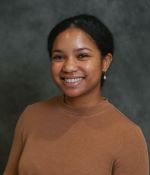
Celine Atkinson, School of Dentistry, focuses her research on the human oral microbiome, aiming to understand the microbial communities that influence diseases like periodontitis and exploring potential strategies for preventing and treating oral diseases. This research has broader implications for systemic health, particularly related to conditions like heart disease and diabetes. Celine’s background includes a Master of Science in Biology with a concentration in cell and molecular biology from the University of South Florida.
Dr. Jeffrey McLean, Professor, Department of Periodontics, describes Celine as “an outstanding young woman scientist with a remarkable work ethic, leadership, and a strong commitment to both her research and teaching.” He ranks her in the top 5% of students, praising her efficiency, high-quality work in the lab, and confidence when presenting her findings at conferences. Dr. McLean highlights Celine’s ability to balance scientific rigor with humility and respect, noting her capacity to foster meaningful scientific discussions.
Beyond research goals, Celine is deeply committed to mentorship and science communication. She has guided both undergraduate and graduate students, helping them develop their research and professional skills. Several of her mentees will present their work at the UW Undergraduate Research Symposium this year, a testament to her impact. Celine is also involved with organizations like Skype-A-Scientist and Letters to a Pre-Scientist, which help young students pursue careers in STEM.
As a Black Asian American woman in science, Celine is passionate about fostering diversity and inclusion. She is dedicated to supporting underrepresented groups in research and inspiring the next generation of scientists. Celine’s commitment to both scientific advancement and mentorship, combined with her advocacy for diversity, positions her as a future leader in the scientific community.
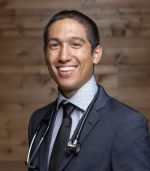 Isaac Knouff, School of Medicine, is an aspiring bariatric surgeon and clinical researcher working to prevent hyperglycemia in patients undergoing abdominal or pelvic surgery using a study drug containing glucose, potassium, and insulin (GIK). Hyperglycemia is a known risk factor for postsurgical complications, especially in diabetic patients. Despite insulin’s clinical significance in surgery, little is known about its anti-inflammatory effects, a gap Isaac is working to address.
Isaac Knouff, School of Medicine, is an aspiring bariatric surgeon and clinical researcher working to prevent hyperglycemia in patients undergoing abdominal or pelvic surgery using a study drug containing glucose, potassium, and insulin (GIK). Hyperglycemia is a known risk factor for postsurgical complications, especially in diabetic patients. Despite insulin’s clinical significance in surgery, little is known about its anti-inflammatory effects, a gap Isaac is working to address.
To further explore insulin’s potential benefits, Isaac established an independent research branch The Anti-Inflammatory Properties of Insulin in Surgery (TAPIS). This study evaluates insulin’s anti-inflammatory effects by tracking biomarkers like C-reactive protein (CRP) and the neutrophil-to-lymphocyte ratio (NLR). TAPIS will also identify patients at risk for a heightened hyperglycemic response, optimizing GIK treatment to reduce surgical complications in diabetic patients.
David R. Flum, Professor of Surgery, notes Isaac’s determination and exceptional work ethic, “Growing up on the rural outskirts of Olympia, Isaac saw the impact of lack of access to healthcare early in life. Determined to rise above challenges, Isaac became a straight-A student, excelled in competitive soccer, and maintained a 3.92 GPA in college, graduating cum laude. Isaac’s contributions extend beyond academics. He demonstrated leadership as president of multiple student organizations, including founding the University of Washington’s first organic chemistry tutoring club. He also serves as an MCAT tutor and has received numerous grants, including the prestigious Henry A. Kuharic, M.D. Endowed Scholarship for Academic Merit.”
Isaac’s work through TAPIS and his broader research efforts are laying the foundation for a career focused on advancing diabetes care and expanding surgical access in underserved rural communities. Bariatric surgery combines Isaac’s passion for surgery, diabetes research, and rural healthcare, allowing him to address the systemic barriers that hinder care in these communities. He is committed to improving outcomes for patients with metabolic diseases while making a lasting impact on the communities that need it most.
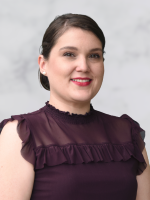 Priscilla Carmiol-Rodriguez, School of Nursing, is a dedicated researcher focused on the intersection of sleep health and cardiometabolic diseases, particularly in underserved Latin American and immigrant populations. Her work addresses sleep health disparities and cultural aspects of sleep in these communities. Drawing from her own experiences as a member of the Latin American community, Priscilla aims to develop culturally appropriate sleep-promoting interventions to improve health outcomes and quality of life.
Priscilla Carmiol-Rodriguez, School of Nursing, is a dedicated researcher focused on the intersection of sleep health and cardiometabolic diseases, particularly in underserved Latin American and immigrant populations. Her work addresses sleep health disparities and cultural aspects of sleep in these communities. Drawing from her own experiences as a member of the Latin American community, Priscilla aims to develop culturally appropriate sleep-promoting interventions to improve health outcomes and quality of life.
In an effort to enhance her research skills, Priscilla is actively seeking advanced training in ethnography, qualitative data analysis, mixed methods, and implementation science. She is also collaborating with research teams focused on migrant farmworker health, a population with a high prevalence of type 2 diabetes. Her dissertation explores sleep-related attitudes and experiences among Latino family caregivers, aiming to develop sleep health-promoting interventions. After earning her PhD, Priscilla plans to pursue postdoctoral fellowships and further develop culturally-sensitive interventions that improve sleep and cardiometabolic health among Latino populations. She also aims to contribute to advancing nursing science in her home country, Costa Rica.
Jonika Hash, RN, PhD, states, “Priscilla’s research in improving sleep health and exploring cardiometabolic health disparities may reduce the risk for diabetes and improve disease management in the context of diabetes diagnosis. Priscilla plans to directly address this gap in her dissertation and future research career.” Priscilla’s research has been published in journals such as Teaching and Learning in Nursing and Enfermería Actual de Costa Rica. She has also presented at several international conferences. Priscilla’s achievements have been recognized with honors such as the 2022 UW School of Nursing de Tornyay Center for Healthy Aging Predoctoral Scholar Award, the 2023 UW Shark Tank Award, and admission into the UW Graduate Certificate Program in Global Health Nursing. Priscilla is also an active community member, collaborating with organizations like Casa Latina in Seattle and serving as the student representative on the School of Nursing PhD Curriculum Committee.
 Hui-Hsuan Chan, School of Pharmacy has a keen interest in improving healthcare sustainability through robust health economics research. Her short-term focus is managing high-cost chronic conditions like diabetes in an effort to alleviate their economic burden, while her long-term goal is to broaden her research to include oncology and rare diseases.
Hui-Hsuan Chan, School of Pharmacy has a keen interest in improving healthcare sustainability through robust health economics research. Her short-term focus is managing high-cost chronic conditions like diabetes in an effort to alleviate their economic burden, while her long-term goal is to broaden her research to include oncology and rare diseases.
Currently, Hui-Hsuan is working on calibrating and validating the Real-World Progression in Diabetes (RAPIDS) model for Taiwan. This model helps physicians determine the optimal time to intensify treatment, thereby preventing diabetic kidney disease, improving patient outcomes, and reducing long-term costs. This model will provide data-driven insights for policy decisions. As diabetes poses a lifelong burden, she is particularly interested in exploring early intervention strategies, patient education, and decision-support tools for more cost-effective, personalized care.
Dr. Josh Carlson, a Professor at the University of Washington, speaks highly of Hui-Hsuan’s academic and research abilities, noting her stellar performance in the rigorous PhD program with a GPA of 3.89. He highlights her significant research experiences, including constructing a decision-analytic cohort model to estimate the economic impact of early genetic risk detection (manuscript under review). Additionally, she contributed to multiple projects with the Institute for Clinical and Economic Review (ICER), including reports on treatments for COPD and spinal muscular atrophy. Hui-Hsuan has also worked on adapting and calibrating the RAPIDS diabetes microsimulation model for Taiwan, aiming to inform clinical decision-making and health policy.
Looking to the future, Dr. Carlson is confident in Hui-Hsuan’s potential to make a major impact in health economics. She plans to return to continue researching how real-world data and health economics can improve patient access and outcomes. Her contributions to both policy and patient care will be invaluable in advancing healthcare sustainability.
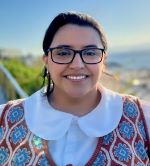 Yilda Macias, School of Public Health, focuses on metabolic health and cancer, particularly within the context of polycystic ovary syndrome (PCOS), a condition often associated with insulin resistance, a precursor to type 2 diabetes (T2D). Despite PCOS being the most common endocrinopathy in individuals of reproductive age, it remains underrepresented in epidemiologic studies, an issue she is deeply committed to addressing. Her work explores how hormonal and metabolic imbalances contribute to the development of T2D and related conditions. Additionally, she is interested in the social and structural factors that drive disparities in PCOS prevalence and severity across racial and ethnic groups, such as healthcare access, health literacy, and cultural influences, all of which may lead to delayed diagnosis, treatment, and subsequent health complications.
Yilda Macias, School of Public Health, focuses on metabolic health and cancer, particularly within the context of polycystic ovary syndrome (PCOS), a condition often associated with insulin resistance, a precursor to type 2 diabetes (T2D). Despite PCOS being the most common endocrinopathy in individuals of reproductive age, it remains underrepresented in epidemiologic studies, an issue she is deeply committed to addressing. Her work explores how hormonal and metabolic imbalances contribute to the development of T2D and related conditions. Additionally, she is interested in the social and structural factors that drive disparities in PCOS prevalence and severity across racial and ethnic groups, such as healthcare access, health literacy, and cultural influences, all of which may lead to delayed diagnosis, treatment, and subsequent health complications.
Under the guidance of her dissertation chair, Dr. Holly Harris, Associate Professor in Epidemiology, Yilda has designed a project that uses advanced epidemiologic methods to deepen our understanding of the relationships between PCOS, T2D, and pancreatic cancer. Her long-term goal is to lead a research group focused on large-scale, population-based studies to explore the life course of PCOS and its impact on chronic disease risk. She envisions her work influencing public health policies, clinical practices, and intervention strategies, improving the quality of life for affected individuals while preventing long-term complications.
“The breadth of Yilda’s research experiences, including laboratory, descriptive and social epidemiology, and data analysis, is impressive. More though, is her perseverance through personal challenges early in her academic career,” explains Dr. Harris. “Yilda has demonstrated resilience, excelling in her MPH program at New Mexico State University, where she was recognized for academic excellence and received Top 5% Graduate Student Honors.”
Dr. Harris also emphasizes Yilda’s organizational and communication skills, noting, “Yilda has consistently set and achieved project milestones, and her collaborative nature will be a great asset in her future work.” Her ambitious dissertation project to enhance our understanding of the genetic, hormonal, and metabolic factors underlying the associations between PCOS, T2D, and pancreatic cancer risk, will allow her to contribute valuable insights to both the scientific community and public health initiatives.
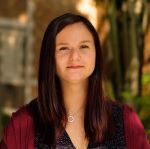 Natalie Turner, School of Social Work, is dedicated to addressing racial and geographic inequities in the provision of Home and Community-Based Services (HCBS) for older adults, particularly those with chronic conditions like diabetes and dementia. HCBS play a crucial role in allowing over 7 million older adults and Medicaid beneficiaries to remain in their communities, offering services such as personal care, adult day programs, and respite. These services are associated with improved health outcomes and are essential for older adults with chronic conditions.
Natalie Turner, School of Social Work, is dedicated to addressing racial and geographic inequities in the provision of Home and Community-Based Services (HCBS) for older adults, particularly those with chronic conditions like diabetes and dementia. HCBS play a crucial role in allowing over 7 million older adults and Medicaid beneficiaries to remain in their communities, offering services such as personal care, adult day programs, and respite. These services are associated with improved health outcomes and are essential for older adults with chronic conditions.
Given that over 25% of older adults have diabetes, ensuring equitable access to HCBS is critical for addressing health disparities in this population. Natalie’s interest in this field stems from her experience as a social worker. Many of her clients reported that Medicaid was their only affordable care option, yet they also faced significant barriers in accessing these services. For her dissertation, Natalie aims to examine the relationship between Medicaid HCBS generosity across racial and ethnic groups, with a particular focus on older adults with diabetes and dementia. This research is timely and necessary as it seeks to address the intersection of racial disparities, chronic diseases, and access to long-term care.
Dr. Clara Berridge, Associate Professor, commends Natalie, saying, “I’ve been impressed by Natalie’s drive and enthusiasm for developing research skills to build knowledge and evidence for improved access and positive healthcare policy change. She has a clear passion for contributing impactful research on to support racially minoritized and economically marginalized older adults who bear the greatest burden of unmet needs for support.” Dr. Berridge also highlights Natalie’s exceptional productivity, noting that she published four articles in high-impact journals during her first year of the doctoral program, two of which she served as first author.
Dr. Berridge further praises Natalie’s research approach, explaining, “Natalie is a licensed clinical social worker whose research stems from her knowledge of the realities and consequences of health and long-term care inequities. Her research questions are original and highly policy-relevant. For her dissertation, Natalie includes rigorous analyses using observational research and quasi-experimental design, applying both the LTSS Environment Framework and HCBS Equity Framework. She has developed strong skills in Medicare and Medicaid claims analysis, which will be crucial to completing her dissertation work.”
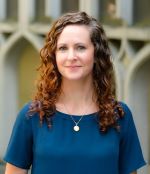 Brittany Jones-Cobb, School of Social Work, centers her research on advancing health equity for marginalized older adults living with chronic conditions and disabilities—particularly those without the support of a familial or chosen care network. Her work is rooted in a deep commitment to improving outcomes for populations disproportionately isolated, often by intersecting systems of oppression related to disability, race, ethnicity, sexual orientation, and gender identity.
Brittany Jones-Cobb, School of Social Work, centers her research on advancing health equity for marginalized older adults living with chronic conditions and disabilities—particularly those without the support of a familial or chosen care network. Her work is rooted in a deep commitment to improving outcomes for populations disproportionately isolated, often by intersecting systems of oppression related to disability, race, ethnicity, sexual orientation, and gender identity.
Brittany’s current research explores the critical intersection of diabetes and caregiving disparities. Diabetes disproportionately affects older adults from historically marginalized groups, including Black, Hispanic, and LGBTQ+ populations. Despite growing recognition of social determinants of health, little is known about how the absence of informal caregivers influences diabetes onset, progression, or related complications in these communities—gaps Brittany is determined to address.
Brittany has already co-authored multiple manuscripts. She is a valued Research Assistant on two federally funded studies—Innovations in Dementia Empowerment and Action (IDEA) and Aging with Pride: National Health, Aging, Sexuality/Gender Study (NHAS)—led by Professor Karen Fredriksen-Goldsen. Dr. Fredriksen-Goldsen states, “Brittany is an ideal candidate as she is deeply committed and passionate in conducting research that improves the health and wellbeing of older adults.” Professor Fredriksen-Goldsen further emphasizes Brittany’s impact and potential, sharing, “She continues to impress me with her analytic abilities, initiative, and willingness to contribute to her own learning.”
The Magnuson Scholar Program is a key component of the Warren G. Magnuson Institute for Biomedical Research and Health Professions Training. The program is funded by a 1991 endowment established in the late Senator’s name. The annual income allows the University of Washington to distribute an award to one scholar from each of the six health sciences schools – Dentistry, Medicine, Nursing, Pharmacy, Public Health and Social Work – annually. As was the case in recent years, the endowment allowed a seventh scholar to receive a scholarship.
Each Health Sciences School nominates their specific scholar on the basis of outstanding academic performance and potential contributions to research in the health sciences. All Magnuson Scholars help continue the legacy of the late Senator Warren G. Magnuson and his remarkable commitment to improving the nation’s health through biomedical research, education, and responsive, sustainable healthcare discoveries. Per the endowment, at least one scholar must be engaged in research related to diabetes, it’s antecedents or treatment.